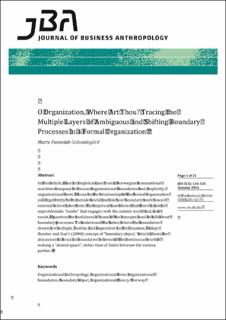| dc.contributor.author | Giskeødegård, Marte Fanneløb | |
| dc.date.accessioned | 2020-06-05T08:53:24Z | |
| dc.date.available | 2020-06-05T08:53:24Z | |
| dc.date.created | 2017-01-03T12:15:42Z | |
| dc.date.issued | 2016 | |
| dc.identifier.citation | Journal of business anthropology. 2016, 5 (1), 116-136. | en_US |
| dc.identifier.issn | 2245-4217 | |
| dc.identifier.uri | https://hdl.handle.net/11250/2656919 | |
| dc.description.abstract | In this article, I use an empirical case from a Norwegian transnational maritime company to discuss organizational boundaries and, implicitly, organizational form. I focus on the relationship of the formal organization as a legal entity to its outside world and ask how boundary work toward external actors takes form. My empirical case shows that there is not an unproblematic “inside” that engages with the outside world and, as a result, I question the usefulness of some of the concepts used to talk about boundary processes. To understand the latter, where the boundaries drawn are multiple, flexible, and dependent on the situation, I adopt Bowker and Star’s (2000) concept of “boundary object,” which allows the discussion to focus on boundaries in terms of the continuous work of making a “shared space”, rather than of limits between the various parties. | en_US |
| dc.language.iso | eng | en_US |
| dc.publisher | Copenhagen Business School | en_US |
| dc.relation.uri | http://ej.lib.cbs.dk/index.php/jba/article/view/5219 | |
| dc.title | O Organization, Where Art Thou? Tracing the Multiple Layers of Ambiguous and Shifting Boundary Processes in a Formal Organization | en_US |
| dc.type | Peer reviewed | en_US |
| dc.type | Journal article | en_US |
| dc.description.version | publishedVersion | en_US |
| dc.source.pagenumber | 116-136 | en_US |
| dc.source.volume | 5 | en_US |
| dc.source.journal | Journal of business anthropology | en_US |
| dc.source.issue | 1 | en_US |
| dc.identifier.cristin | 1419845 | |
| dc.description.localcode | © The Author(s) 2016 ISSN 2245-4217. www.cbs.dk/jba | en_US |
| cristin.ispublished | true | |
| cristin.fulltext | original | |
| cristin.qualitycode | 1 | |
